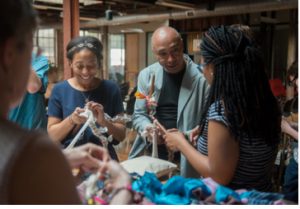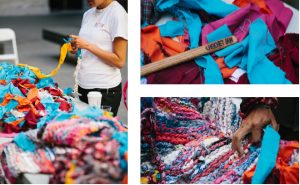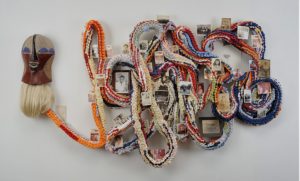Ramekon O’Arwisters Crochet Jam: Making Space for Change
by Leora Lutz

A few years ago, Ramekon O’Arwisters walked away from a civic museum art administration job to devote himself fulltime to engaging with the public in meaningful ways through public art making. He asked himself during this time of reassessment, “How can I envision my practice in a way that helps me and helps others?” In 2012, he started Crochet Jam, a social practice participatory project where people are invited to crochet together.
O’Arwisters comes from a lineage of textile workers and artisans; his family worked for Haines in Winston-Salem North Carolina and his grandmother made quilts, firmly urging O’Arwisters to sew alongside her. Previously a painter, he came to a point where he realized that “painting was not communicating my experience,”1 and turned his energy toward textiles, making work that combined crochet and masks with family photos. “I want Crochet Jam to inform me about what it wants to become,” he said, “Instead of me trying to wrangle or wrestle my practice into something it doesn’t want to be.”
Crochet Jam creates a space where people are encouraged to let go of their preconceived notions of what art is, of labor, even the role of artist as authority. “If I want to be trustworthy with the authenticity of my practice, then I have to be willing to let go of the perception of what it means to be a ‘successful’ artist.” The crochet strands are later assembled into abstract expressionistic rag rugs by O’Arwisters. His many archives are symbolic of the many people becoming unified by collective crochet. “We make rugs together—it’s primal.”
He is very open to the potential of where Crochet Jams take place, thinking about the various kinds of venues, including art centers, museums, galleries, cafes, public parks—even senior citizen spaces. A lot of people ask, “What are we making?” to which O’Arwisters replies, “We are making social interactions, creativity. You are a silent witness to the creative process.” For him, there is value in “relaxing, being outside the context of a society that forces us to conform—our agency is always corrupted by capitalism. Crochet Jam is all about regaining that agency.”
68 / SURFACE DESIGN JOURNAL
Ramekon O’Arwisters (center) helping participants at the Crochet Jam held in conjunction with the “Queer Threads: Making and Talking, Fiber and Fashion” Symposium (April 10–14, 2017) at Virginia Commonwealth University School of the Arts, Richmond, VA. Photo courtesy of the artist and VCUarts.
Through August of 2017, O’Arwisters was the first artist in residence at the artist-run café George and Lennie,2 located in San Francisco’s Tenderloin District. Crocheting was preceded by mindful meditation sessions, which he also teaches. In June, he led a Crochet Jam as part of a summer art-in-the-park program in Liberty Park, Asbury, New Jersey. Parents were teaching their children, and strangers began helping others. He told the story of a man who approached the tables and left, later to return and begin crocheting. Afterward, the man shared: “My father died on Father’s Day, and I didn’t know what to do, I just wanted to go somewhere—I am so glad you are here.” It’s moments like this that remind O’Arwisters that he made the right decision to walk away from his job a few years ago and work toward making change—one knot at a time.
1 All quotes are from a conversation between the artist and the author.
2 George and Lennie is owned and operated by artist Brett Walker, who views the space as “an art project in and of itself.” [Cited from Artsy, “9 Artist-Run Food Establishments, from Los Angeles to Berlin,” March 28, 2016.]
To learn more about Ramekon O’Arwisters, visit crochetjam.com. He is featured in the book Queer Threads: Crafting Identity and Community by John Chaich and Todd Oldham (Ammo Books, March 2017). To read a review, turn to page 66.
—Leora Lutz is a San Francisco Bay Area writer and artist. She has published articles since 2005 for numerous publications, galleries, artists, and museums. leoralutz.com


©2017 Surface Design Association, Inc. All rights reserved. FALL 2017 / 69 Reproduction without permission is strictly prohibited.
